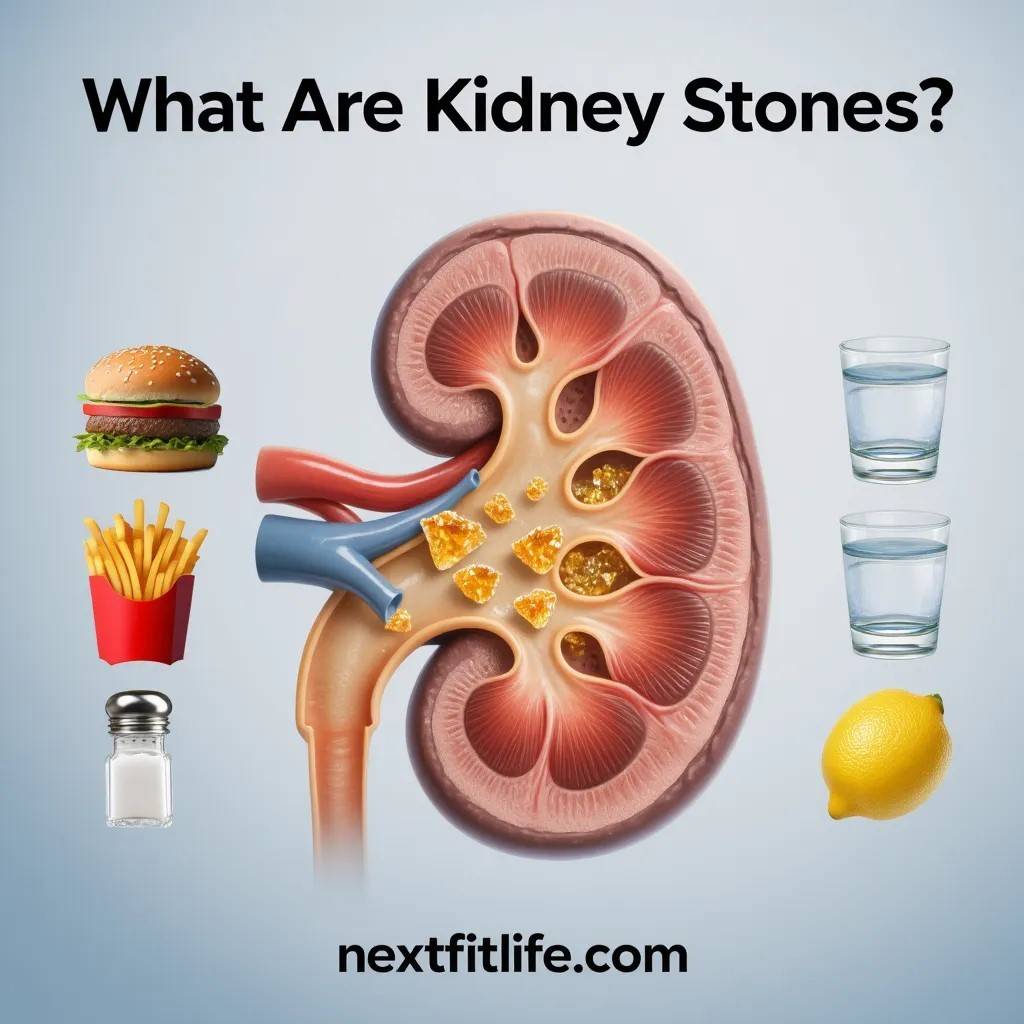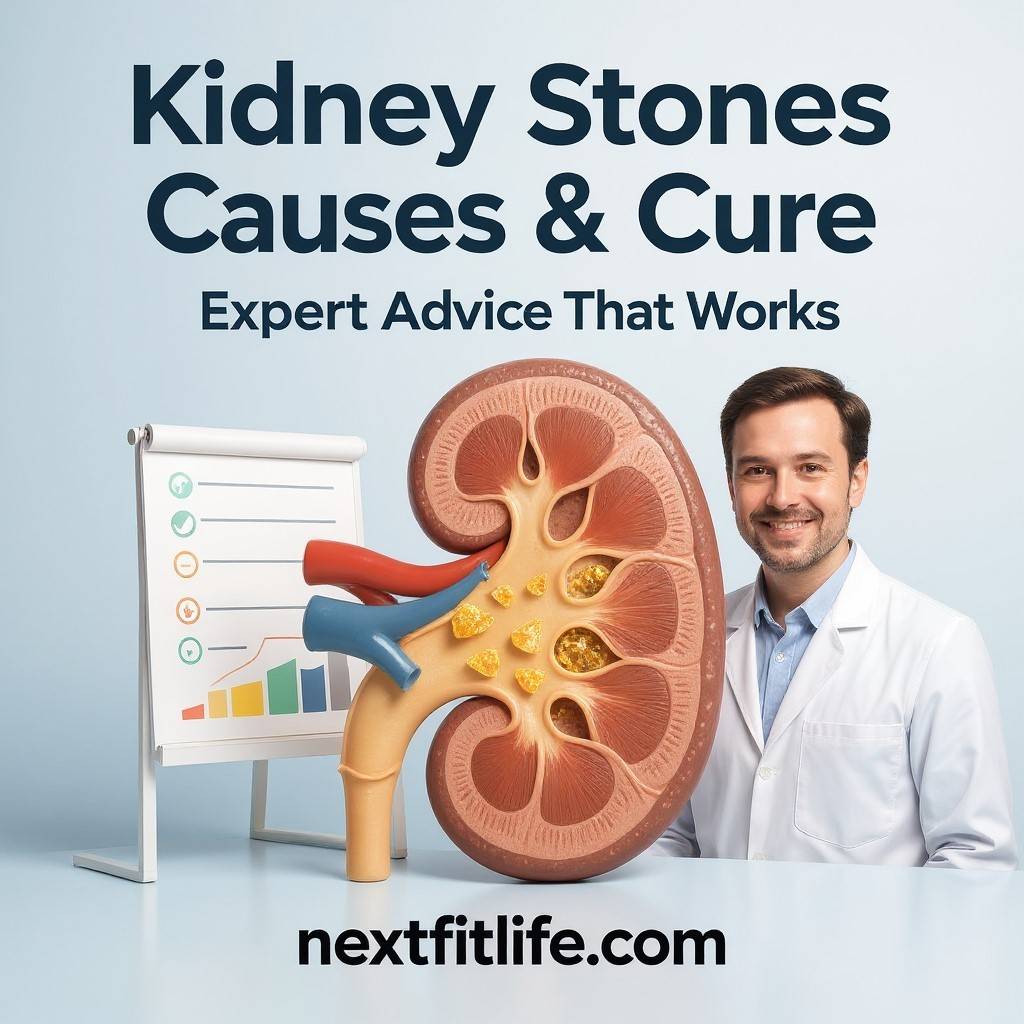Kidney stones are a painful surprise no one wants. These tiny, hard crystals form in your kidneys and can cause sharp pain when they move. The good news? Most Kidney stone pain passes with simple steps like drinking water and eating properly. This guide explains causes, cures, and prevention in easy words.
You’ll feel ready to take charge and keep stones away. I’ve felt that stabbing back pain myself was the culprit. With lots of water and a few changes, I got through it. Let’s dive into kidney stones with clear, expert tips to help you feel better fast.
What Are Kidney Stones?

They are hard lumps that grow in your kidneys. They form when minerals like calcium or uric acid in your urine stick together. They can be as small as sand or as big as marble. Small ones may pass without your noticing. Bigger ones? They cause serious kidney stone pain.
Your kidneys clean your blood, sending waste to urine. Too many minerals or too little water can create renal calculi. Anyone can get them, but men and people over 30 are more likely.
Key Fact: About 1 in 10 people will face Kidney stone symptoms, says the National Kidney Foundation.
The Four Main Types of Kidney Stones
Knowing what type of kidney stone you have is crucial for effective prevention and treatment.
| Type of Stone | What Causes It | Key Prevention Tip |
| Calcium Oxalate (Most Common) | High oxalate foods (spinach, nuts), high sodium, low calcium. | Eat enough calcium from food; don’t avoid it. |
| Uric Acid | High-protein diets, gout, and not enough water. | Limit red meat and organ meats; drink more water. |
| Struvite | Urinary tract infections. | Treat UTIs promptly. |
| Cystine (Rare) | A genetic disorder is called cystinuria. | Requires specialized medical management. |
How Common Are Kidney Stones?
You might be surprised at how widespread Kidney stone symptoms are. They affect people of all ages, but adults are hit hardest. In the U.S., about 10% of people get a stone at some point. Men are twice as many as women, and rates are rising because of diet and lifestyle changes.
In tropical climates, like the South, stones are even more common because of dehydration. I’ve seen friends in warmer areas struggle more—it’s no coincidence. Staying hydrated is key wherever you live.
Key Fact: Cases of kidney stones have increased 3% per decade, per Johns Hopkins.
Actionable Tip: Check your risk by asking family if they’ve had stones. It helps you plan prevention early.
Causes of Kidney Stones
What makes Kidney stone symptoms form? It’s often a mix of diet, habits, and your body. Low water intake is a top reason—urine gets thick, and crystals grow. Here are the major causes of Kidney stone pain:
Low Water Intake
Your kidneys need water to flush waste. Less than 8 cups a day? That’s trouble.
- Hot days or workouts dry you out fast.
- Clear urine shows you’re hydrated enough.
I skipped water during a busy week once—guess what? A stone showed up.
Poor Diet Choices
Eating too much salt, sugar, or meat raises the risk of calcium oxalate stones. High-oxalated foods like spinach or nuts can be added to it.
- Soda and fast food contain too much sodium.
- Low calcium (like skipping dairy) can hurt.
Actionable Tip: Swap soda for water with a lemon slice. It’s refreshing and fights Renal stones.
Risk Factors for Kidney Stones
Certain things make Kidney calculi more likely. Knowing your risks helps you stay ahead.
- Family History: If parents or siblings had stones, your odds go up.
- Age and Gender: Men aged 30-50 are at higher risk.
- Climate: Hot, dry areas increase dehydration.
- Obesity: Extra weight changes urine chemistry.
- Diet: High salt, sugar, or protein diets are culprits.
I’ve noticed my love for salty snacks wasn’t helping. Cutting back made a difference.
Actionable Tip: Weigh yourself monthly. Keeping a healthy weight lowers your kidney stones.
Medical Conditions That Increase Kidney Stone Risk
Some health issues make kidney stones more likely. These conditions mess with how your body handles minerals.
- Gout: Raises uric acid stones.
- Diabetes: Changes urine pH, sparking stones.
- High Blood Pressure Affects kidney function.
- Urinary Tract Infections: Can form struvite stones.
- Kidney Disease: Slows waste filtering.
I have a friend with gout who got stones—managing it cut his risk big time.
Actionable Tip: Get regular check-ups. Controlling diabetes or blood pressure helps stop kidney stones.
Symptoms of Kidney Stones
Kidney stone symptoms can hide or hit hard. Small ones might pass unnoticed. Bigger ones cause trouble. Here’s what to look for in kidney stone symptoms:
Sharp Pain
A sudden, sharp pain in your back, side, or lower belly. It comes in waves as the stone moves.
- Pain can spread to your groin or thighs.
- Nausea or vomiting often joins in.
Urine Problems
- Pink or red urine from blood.
- Burning when you pee.
- Cloudy or smelly urine.
Key Fact: Kidney stone pain can feel worse than childbirth, says Mayo Clinic.
Actionable Tip: If pain hits, try a warm bath. It relaxes muscles while you wait for help.
How Are Kidney Stones Diagnosed?
Think you have Kidney stone symptoms? A doctor can confirm with tests. They’ll ask about your pain and habits first.
Tests to Confirm
– Urine Test: Checks for blood, crystals, or infection.
– Blood Test: Looks at calcium or uric acid levels.
Imaging Tools
- Ultrasound: Safe, no radiation, spots stones.
- CT scan: Finds even tiny stones fast.
Actionable Tip: Write down your symptoms before the visit. It speeds up kidney stone diagnosis.
Can Kidney Stones Go Away on Their Own?
Yes, many Renal stones pass without medical help, especially if they’re small (under 5mm). Drinking lots of water helps them move through your urinary tract naturally. Pain relievers ease discomfort while you wait.
- About 80% pass within 3-4 weeks, per the Cleveland Clinic.
- Bigger stones (over 6mm) often need a doctor’s help.
Actionable Tip: Sip 2-3 liters of water daily. It’s the best way to help kidney stones pass naturally.
Kidney Stone Treatment Options
When kidney stones don’t pass alone, treatments help. Options depend on size and pain.
Passing Small Stones
Small stones pass with hydration and rest.
- Drink 2-3 liters of water daily.
- Use pain meds like ibuprofen.
Breaking Up Stones
Bigger stones need technology.
- Shock Wave Lithotripsy: Sound waves break stones into bits.
- Done in a clinic, no surgery needed.
Surgery for Big Stones
If stones cause urinary tract blockage:
- Ureteroscopy: A scope removes or lasers the stone.
- Percutaneous Nephrolithotomy: A small incision for large stones.
Actionable Tip: Use a urine strainer. Catching the stone helps doctors plan your kidney stone treatment.
Natural Remedies for Kidney Stones
Ease kidney stone pain relief at home. These natural remedies for kidney stones help, but check with a doctor.
Lemon Water
Lemon juice raises citrate, slowing stone growth.
Mix half a lemon in 8 oz of water, drink twice daily.
I love this—it’s tasty and helpful!
Heat Therapy
A heating pad or warm bath soothes pain.
- Apply heat to your back for 15 minutes.
- Breathe deeply to stay calm.
Safety Note: Ask your doctor before trying remedies, especially if on meds.
Best Diet for Kidney Stone Prevention
Your food choices can stop urinary stones. A smart kidney stone diet keeps minerals balanced.
- Eat More: Calcium-rich foods like milk or yogurt (binds oxalate).
- Eat Less: Salt (under 2,300mg), oxalate foods like spinach.
- Add: Citrus fruits, whole grains, and veggies.
- Avoid: Sugary sodas, too much red meat.
I cut salty chips and added yogurt—my kidneys thank me!
Actionable Tip: Plan meals weekly. Include a citrus fruit daily to boost kidney stone prevention.
Living With Kidney Stones
Having urinary stones can feel scary, but you can manage. Stay proactive and listen to your body.
- Keep hydrated every day—no excuses.
- Follow your doctor’s advice for medicines or diet.
- Join support groups for tips from others.
I’ve connected with others online—it’s nice to know you’re not alone.
Actionable Tip: Set a phone reminder to drink water hourly. It builds a habit of managing kidney stones.
How to Prevent Kidney Stones
Stopping urinary stones is easier than treating them. Minor changes keep your kidneys happy. Here’s your kidney stone prevention plan:
Drink Plenty of Water
Aim for 12 cups daily in hot weather.
- Add fruit slices for flavor.
- Skip soda and limit coffee.
Eat a Smart Diet
Balance your plate to lower risk.
- Eat: Calcium-rich foods like yogurt to bind oxalate.
- Limit Salt to 2,300mg daily, oxalate foods like spinach.
- Add fruit and whole grains.
Stay Active
Exercise for 30 minutes most days. It helps control weight.
> Key Fact: Losing 5-10% of body weight cuts stone risk by 30%, says Johns Hopkins.
> Actionable Tip: Use a water app to track intake. It’s fun and keeps kidney stones away.
When to See a Doctor for Kidney Stones
Don’t wait if urinary stones cause trouble. Call a doctor if:
- Pain is severe or lasts for hours.
- Fever over 101°F or chills.
- You can’t pee or see lots of blood.
Tip: I called my doctor when the pain wouldn’t stop. Quick action saved me from misery.
FAQs About Kidney Stones
How to clear kidney stones?
Drink 2-3 liters of water daily to flush small kidney stones. Pain meds and alpha blockers help. Enormous stones need shock waves or surgery.
What foods cause kidney stones?
Foods that cause kidney stones include salty snacks, soda, and high-oxalate foods like spinach. Too much meat raises uric acid stones.
What does kidney stone pain feel like?
Kidney stone pain feels like sharp, cramping waves in your back, side, or belly. It may spread to your groin with nausea.
How long does it take to pass a kidney stone?
Small kidney stones take 3-4 weeks to pass with water. Bigger ones need medical help and may take longer.
Key Takeaways
- Kidney stones form from minerals in concentrated urine.
- Watch for sharp pain, blood in urine, or fever—see a doctor fast.
- Most pass with water; big ones need procedures.
- Prevention with 12 cups of water, low salt, and a balanced diet.
- You can manage renal stones with smart habits.
Conclusion
Kidney stones can feel like a nightmare, but you’re stronger than they are. I’ve been through that pain and found relief with water, diet tweaks, and doctor advice. This guide covers everything—causes, cures, and how to stop renal stones for good. Start sipping water now, and if pain hits, don’t wait to get help. Here’s to a healthier, pain-free you!



